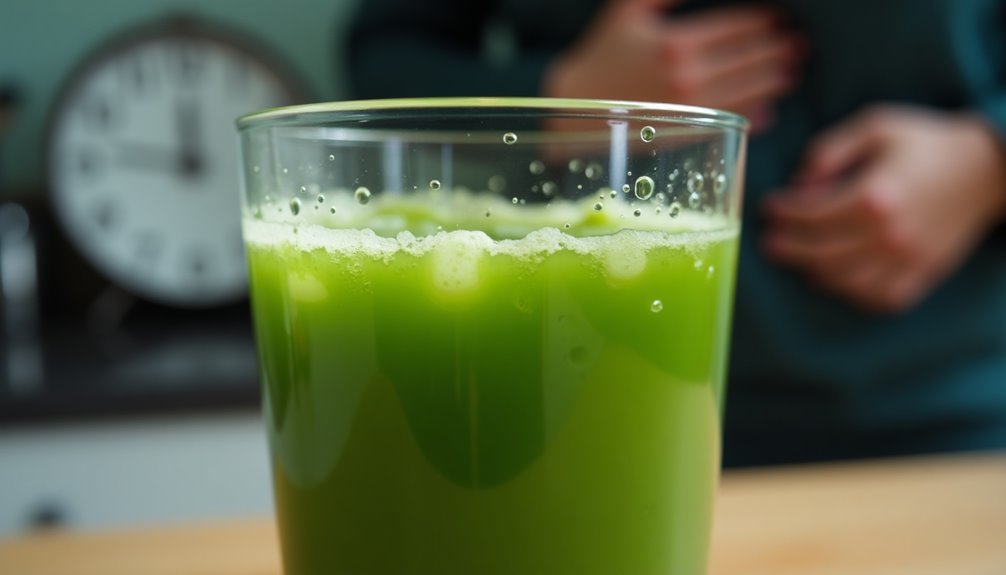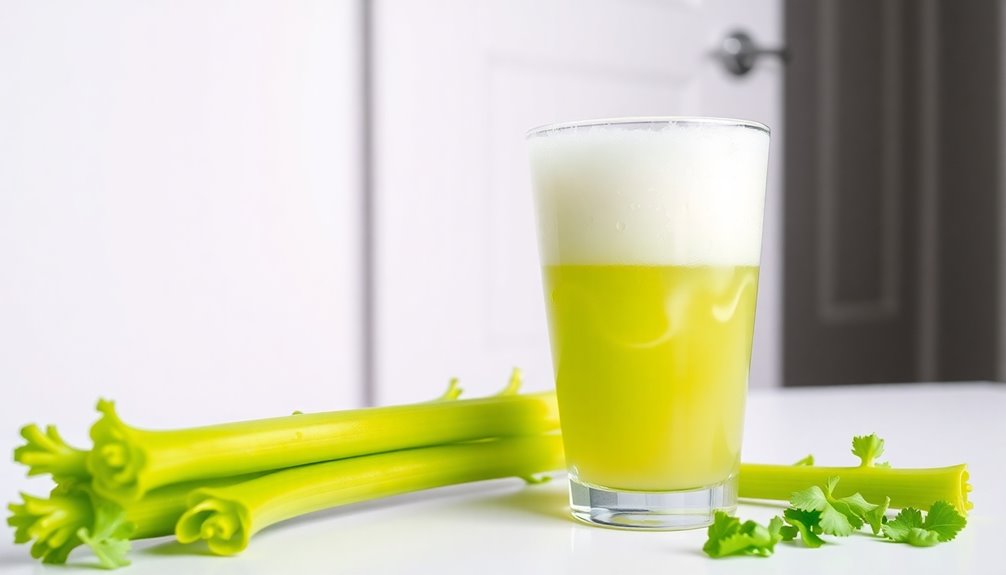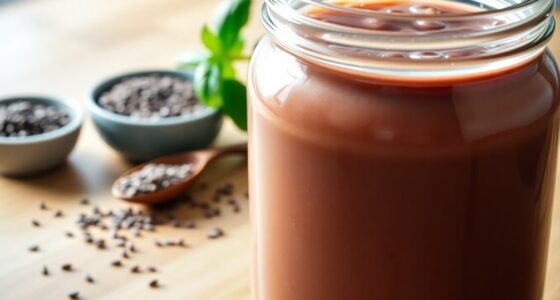Celery juice can cause diarrhea primarily due to its high mannitol content, which draws excess water into your intestines. Symptoms usually last from a few hours to a couple of days, depending on how your body tolerates it. To ease symptoms, start with a small amount and gradually increase your intake. If diarrhea persists for more than three days, it’s wise to consult a healthcare professional. There’s more to discover about managing your digestive health effectively. In addition to being mindful of celery juice, consider the potential benefits of other beverages for your digestive health. For example, apple juice and constipation relief can often go hand-in-hand, as the natural sugars and sorbitol in apples help to stimulate bowel movements. Pairing these juices with a balanced diet rich in fiber can further support your overall gastrointestinal health.
Key Takeaways
- Diarrhea from celery juice may last from a few hours to a couple of days, varying by individual tolerance.
- Symptoms can occur shortly after consumption due to high mannitol levels in celery juice.
- Gradual introduction of celery juice can help minimize the severity of symptoms.
- Persistent diarrhea lasting longer than three days should be evaluated by a healthcare professional.
- Dehydration may occur with prolonged diarrhea, making monitoring essential for digestive health.

If you've recently added celery juice to your diet, you might find yourself dealing with an unexpected side effect: diarrhea. Many people rave about the supposed health benefits of celery juice, but for some, it can lead to a less-than-pleasant experience in the restroom. It's essential to understand why this happens and how long you might be dealing with it.
The root cause of diarrhea after drinking celery juice often lies in its high levels of mannitol, a sugar alcohol that can draw excess water into your intestines. This influx can lead to looser stools and, in some cases, uncomfortable cramping. If you have a sensitive digestive system or conditions like IBS, you might notice these effects more intensely. For you, the onset of diarrhea may occur shortly after consuming the juice, sometimes lasting from a few hours to a couple of days, depending on your individual tolerance.
When you first start drinking celery juice, your body may need time to adjust to this new addition. If you jump in with full glasses right away, you could overwhelm your digestive system. To reduce the likelihood and severity of diarrhea, consider a gradual introduction to celery juice. Start with a small amount and slowly increase your intake over time. This way, your body can adapt, potentially minimizing digestive upset.
If you find that your symptoms last longer than three days, it's wise to consult a healthcare professional. Persistent diarrhea can lead to dehydration and might signal underlying issues that need to be addressed. A healthcare professional can help rule out any other digestive disorders you may not be aware of and provide guidance tailored to your situation.
For those who experience looser stools after introducing celery juice, it's important to monitor how your body responds. Pay attention to any changes in your digestion, and keep in mind that everyone's tolerance varies. Some people may find that they can enjoy celery juice without any issues, while others may need to rethink their approach.
You might also want to consider other factors that can influence your digestive health, such as diet, hydration, and stress levels. Sometimes, it's not just the celery juice itself causing the problem, but a combination of different lifestyle elements. Adjusting these can also help your body cope better with new dietary changes.
Frequently Asked Questions
Is It Normal to Have Diarrhea After Celery Juice?
Yes, it's normal to experience diarrhea after drinking celery juice, especially if you're not used to high-fiber foods or have a sensitivity to natural sugars like mannitol.
Celery juice can have a laxative effect due to its carbohydrate content, which may lead to looser stools.
If it continues for more than a few days, you might want to consult a healthcare professional to ensure there aren't any underlying issues affecting your digestion.
Is Celery Juice Like a Laxative?
Yes, celery juice can act like a laxative for some people.
It contains mannitol, a sugar alcohol that draws water into your intestines, promoting bowel movements. If you've got a sensitive digestive system, you might notice more frequent trips to the bathroom.
The high water content can also contribute to this effect.
Just keep an eye on how your body responds, and consult a healthcare professional if you experience persistent digestive issues.
Why Do I Feel Bad After Drinking Celery Juice?
You might feel bad after drinking celery juice due to its high mannitol content, which can upset your digestive system.
If you're not used to liquid diets, the sudden intake can cause bloating or discomfort. Additionally, if you have sensitivities or pre-existing gut conditions like IBS, you may experience more pronounced reactions.
To ease these issues, try incorporating celery juice gradually instead of jumping in with large amounts right away.
How Long Does It Take to Digest Celery Juice?
Isn't it amusing how something so watery can be digested so quickly?
When you drink celery juice, your body typically processes it in about 30 to 60 minutes. The high water content helps it slide through your system, while the absence of fiber accelerates digestion. This quick absorption means that the nutrients in celery juice can be made available to your body almost immediately, providing a refreshing boost of hydration and essential vitamins. Moreover, the low calories in celery juice revealed make it a perfect choice for those looking to maintain a healthy diet without adding extra calories. As a result, many people incorporate it into their morning routines for an energizing start to their day.
However, if you've got a sensitive stomach, you might find that your experience varies.
Conclusion
In conclusion, experiencing diarrhea from celery juice can feel like a sudden storm, leaving you scrambling for shelter. Typically, the effects last anywhere from a few hours to a couple of days, depending on your body's reaction. It's essential to listen to your body and stay hydrated during this time. If symptoms persist or worsen, it's wise to consult a healthcare professional. Remember, moderation is key when introducing any new food or drink into your diet.
Cindy thoroughly researches juicing trends, techniques, and recipes to provide readers with practical advice and inspiration. Her writing style is accessible, engaging, and designed to make complex concepts easy to understand. Cindy’s dedication to promoting the advantages of juicing shines through her work, empowering readers to make positive changes in their lives through the simple act of juicing.











